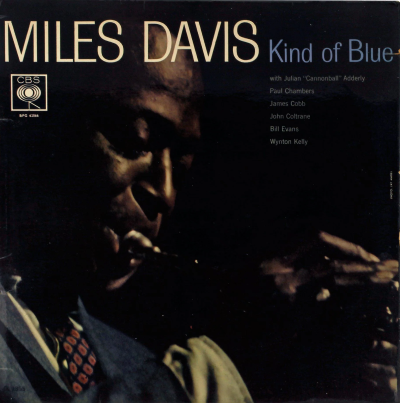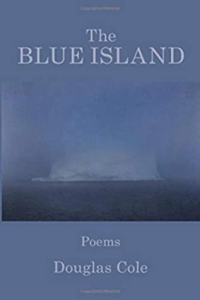.
.
Trading Fours with Douglas Cole is an occasional series of the writer’s poetic interpretations of jazz recordings and film.
A recording of Mr. Cole reading this work is found at the conclusion of the poem.
.
.
___
.
.

Miles Davis’s 1959 album, Kind of Blue [Columbia]
.
___
.
What We Talk About When
We Talk About Kind of Blue
I know people say things like
Kind of Blue is the best Jazz ever,
with that sort of weird awe.
Garreth, Sybil’s English boyfriend,
just said, “You have to hear this.”
Let me say, it hit…that’s it.
A missing piece of cosmic wave
captured, and I listened to it
over thinking how this fits.
“So What” pouring forth from
cymbal crash to cascade notes,
while I’m driving north on 35th
after teaching a night class,
headlights down a tunnel of trees,
soft light falling all around,
ready for a beer, a little smoke,
my debt to the universe paid.
That statement like a thesis
throughout, so what…so what…
but not in a negative way,
more a mantra how to feel,
how to move through all of this…
What did Davis hear in Evans?
Something light, starlight, a quiet
thread in the whole piece,
integral—in the music.
In “Freddie Freeloader” you hear
Wynton Kelly hit a chord
a little after the beat,
the same way Monk does
as though he’s in a slow-motion
between-worlds where he can
look at the whole song
and decide where to put his notes.
Pure improvisation, no standard,
only one inexorable run…
for everyone who hears, now,
their own movie version
because the song lives
when we hear it and we add
a living instrument with heart
and mind playing and receiving,
like Davis watching Louis Malle
and laying down the soundtrack
for Ascenseur Pour L’echafaud,
we’re all adding mood and scene
playing with angels and ghosts.
So why is Kind of Blue it?
I’d heard John Coltrane go up
and out of “My Favorite Things,”
into wild geese flying high
with the moon on their wings,
the beautiful sheer will of spirit
seeking through the instrument,
that singularity vision-UR
on Saturday afternoon
in Charlie’s apartment,
but again, I was high on acid.
Heard Art Tatum, fastest fingers ever,
coding out his tunes in pure strike
like a fierce and swinging Morse code.
Heard Charlie Parker bringing down
messages eyes geared heavenward.
Heard Louis Armstrong voicing
American chilly depression-era
and blown-out world war men,
made light in high sorrowful joy…
hard to explain, not for me to explain,
but like sonnets of sound in a way:
conflict on conflict moves to resolution,
I’d heard all that, and yet, still, still…
in Kind of Blue there’s another bit
of the plan showing and unfolding
another kind of yes in the universe.
Modal…modal…what is that?
Sketches, notes on paper,
all of it coming nearly ex nihilo,
ideas of ideas, nothing familiar about it,
pure genius locking into each other
and creating in one fell swoop
this thing that would make heads turn,
that would click and resonate immediately
outward and onward—that is it.
.
Listen to Douglas Cole read “What We Talk about When
We Talk about Kind of Blue“
.
.
___
.
.
Listen to “Freddie Freeloader” from Kind of Blue, with Miles Davis (trumpet); Julian “Cannonball” Adderley (alto saxophone); John Coltrane (tenor saxophone); Wynton Kelly (piano); Paul Chambers (bass); and Jimmy Cobb (drums). [Columbia/Legacy/Miles Davis]
.
.
___
.
.
photo by Jenn Merritt

.
Douglas Cole has published six collections of poetry and The White Field, winner of the American Fiction Award. His work has appeared in several anthologies as well as journals such as The Chicago Quarterly Review, Poetry International, The Galway Review, Bitter Oleander, Chiron, Louisiana Literature, Slipstream, as well Spanish translations of work (translated by Maria Del Castillo Sucerquia) in La Cabra Montes. He is a regular contributor to Mythaixs, an online journal, where in addition to his fiction and essays, his interviews with notable writers, artists and musicians such as Daniel Wallace (Big Fish), Darcy Steinke (Suicide Blond, Flash Count Diary) and Tim Reynolds (T3 and The Dave Matthews Band) have been popular contributions. He has been nominated twice for a Pushcart and Best of the Net and received the Leslie Hunt Memorial Prize in Poetry. He lives and teaches in Seattle, Washington.
Click here to visit his website.
.
.
The poet’s collection, The Blue Island
.
.
___
.
.
Click here to read previous editions of Trading Fours with Douglas Cole
Click here to read The Sunday Poem
.
Click here to learn how to submit your poetry or short fiction
Click here to subscribe to the Jerry Jazz Musician newsletter
Click here to help support the continuing publishing efforts of Jerry Jazz Musician (thank you!)
.
.
.

































